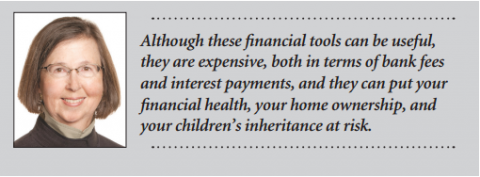
If you watch TV these days, it's hard to avoid Fred Thompson, Robert Wagner and a variety of other actors encouraging you to consider a reverse mortgage if you are strapped for cash. Although these financial tools can be useful, they are expensive, both in terms of bank fees and interest payments, and they can put your financial health, your home ownership and your children's inheritance at risk.
Because of these problems, the default rate on reverse mortgages has been significant, and in response, Congress has recently passed the Reverse Mortgage Stabilization Act of 2013 which gives new powers to federal regulators to change the rules of the program "to improve … fiscal safety and soundness …." As a result, most homeowners will no longer have access to large lump sum payments up front, they may be required to set up escrow accounts for insurance and property taxes, and financial assessments will be required.
If you are considering applying for a reverse mortgage, here are ten things you should know before proceeding:
Click here to read the full article by Attorney Ami Weber.

